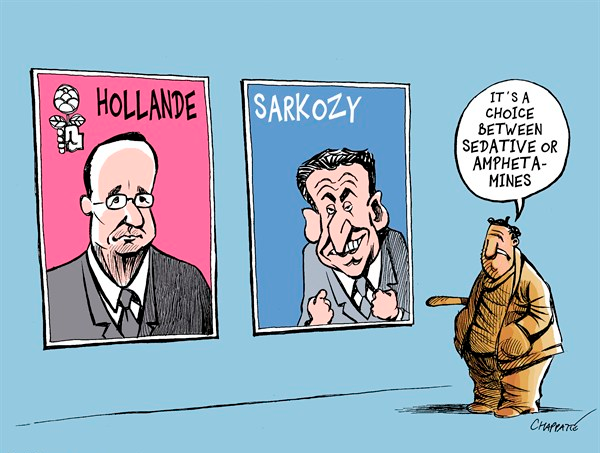 With the first round of elections over, the campaign for the Presidency of France between the two top candidates, François Hollande and Nicholas Sarkozy begins under the cloud of most of Europe in economic recession. Just how much the latest news of England slipping back into recession under the weight of the Cameron government’s austerity measures along with increased taxes, remains to be seen but there are signs that it is already having an impact:
With the first round of elections over, the campaign for the Presidency of France between the two top candidates, François Hollande and Nicholas Sarkozy begins under the cloud of most of Europe in economic recession. Just how much the latest news of England slipping back into recession under the weight of the Cameron government’s austerity measures along with increased taxes, remains to be seen but there are signs that it is already having an impact:
To the left: a likely new direction for France and Germany
If a new austerity-sceptic alliance emerges across the Channel, will Cameron and Osborne end up as Europe’s last deflationists?
Quite suddenly, there is talk of change in the eurozone’s economic strategy and, in particular, of the need for urgent action by the European Union to reverse the downward spiral of negative growth and rising unemployment. The likelihood that François Hollande will be elected as president of France next weekend has injected an important note of dissent into the pro-austerity consensus. Even more important than the French elections, however, may be the indications that even the political debate in Germany is now changing its tune.
The opposition German social democratic SPD hopes for election victory in the key state of North Rhine Westphalia on 13 May, as well as in the German general election next year. The SPD has already signalled that it will support the French Socialists in support of an investment-led EU strategy to boost growth and jobs. Moreover, the German social democrats and the German Green party also back the creation of euro-bonds and using the proceeds of a tax on financial transactions to finance a return to growth.
Chancellor Angela Merkel is a bit nervous about a Hollande government:
It is unclear at this time whether next year’s German general election will lead to an SPD/Green coalition government or to a “grand coalition” of the SPD and Chancellor Merkel’s Christian Democrats. But Angela Merkel has already sent some of her top advisers to Paris to explore the proposals of the French Socialists and to see to what extent she and a future President Hollande might be able to salvage a Franco-German partnership in the EU.
The conservative German government is resolutely opposed to any formal re-negotiation of the “stability and governance treaty” which has been cited to justify the crippling austerity measures imposed on Greece and other eurozone “peripheral” economies. But Hollande is now focussing on a series of “additional measures” rather than actual “changes” to the treaty. These additional growth measures would include a major boost to the resources of the European Investment Bank to allow it to put far more capital to work, especially in the hardest-hit economies. Second, the French Socialists would like to see the European stability mechanism given the status of a bank, so that it can receive funding from the European Central Bank and thus be better able to contain any future crisis affecting the euro. Third, they argue for widening the mandate of the ECB so that it is obliged to pursue growth objectives as well as price stability.
Unsurprisingly, a number of sympathetic noises off are being heard from Rome, Madrid and other EU countries, where centre-right governments which are struggling against economic suffocation by obsessive austerityitis.
President Nicholas Sarkozy, who is behind Hollande 54% to 46% in the polls, has said that there would be no coalition with the far right wing National Front Party, whose candidate, Marine Le Pen garnered 17.9% of the vote placing third:
“There will be no pact with the Front National,” he told France Info radio, adding there were too many issues on which they disagreed to imagine giving the party cabinet posts. The Front National has called for France to quit the euro and a hold a referendum on the death penalty, both far from Sarkozy’s manifesto.
“There will be no Front National ministers, but I refuse to demonise men and women who in voting for Marine Le Pen cast a crisis vote, a vote of anger, a vote of suffering and a vote of despair. I have to listen to their message and take them into account, and not think it’s time to hold my nose,” Sarkozy said.
Currently the National Front holds no seats in the French Parliament but hope to change that in the up coming national elections in June.
Geographically, Le Pen has broadened Front National support beyond her father’s heartlands in the south, and polled well in villages and rural constituencies across the country as well as on the outskirts of cities. She did well in the depressed former industrial areas of the north and east, but also saw increases in support in rural areas beyond Bordeaux and in Normandy. The prospect of Front National gains has left Sarkozy’s ruling UMP party, a broad coalition of centre right and rightwing factions, scrapping over what tack to take to hang on to their seats. The party is already divided and facing an internal battle over its future if Sarkozy loses the election
There will obviously be a battle for Le Pen’s 6.4 million voters with the far left accusing Sarkozy of drifting too far to the right, making some ugly comparisons:
The communist paper L’Humanité sparked a row with its front page comparing Sarkozy to Marshal Pétain, the leader of France’s Nazi collaborationist Vichy regime in the 1940s, who was convicted of treason after the second world war.
The paper said Sarkozy’s decision to hold his own Labour Day rally in Paris on 1 May to celebrate what he termed “real” work, as opposed to the traditional, trade-union-led rallies by the left, harked back to a Pétain-style discourse. Pétain – whose motto was “travail, famille, patrie” (work, family, country) – had aimed to reclaim 1 May for the right.
Max Staat wrote: “Sarkozy isn’t Pétain, happily, but the similarities point to the dangers for our country of the president-candidate adopting the theses of the extreme right.”
And you thought American political campaigns were ugly. Fortunately, the election is May 6, eleven days and all campaigning ends on Friday May 4.
Click on image to enlarge



 The French Presidential election will take place this Sunday, May 6. Meanwhile, the campaigning has ended Friday evening with the Socialist challenger,
The French Presidential election will take place this Sunday, May 6. Meanwhile, the campaigning has ended Friday evening with the Socialist challenger, 

Recent Comments